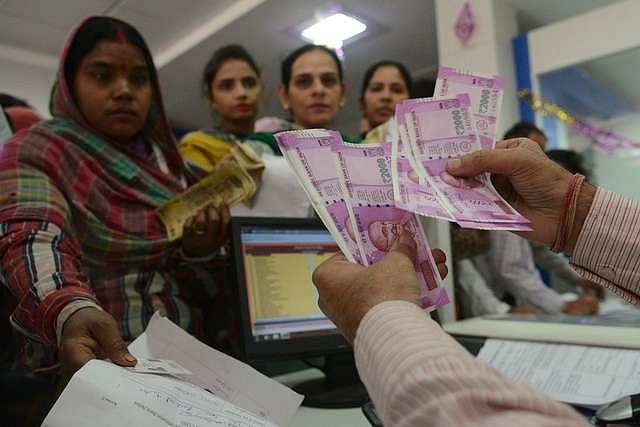Economy
More Small Firms, Increase In IT Returns And Growth: Is Modi’s War On Corruption Starting To Bear Fruit?
- There is no direct correlation between fall in corruption and pickup in growth but OECD research states that corruption negatively impacts key economic fundamentals.
- So will the impact of the war on corruption and illegitimate cash pave the way for higher growth in future?

Demonetisation ... the government’s biggest move till date to eradicate corruption.
“Na Khaunga, Na Khaane Doonga” was one of the most compelling slogans of Bharatiya Janata Party’s (BJP) prime ministerial candidate Narendra Modi in the run up to 2014 general election. It resonated the most with the voters because they were tired of opening their daily newspapers and reading one scam or another under the previous United Progressive Alliance (UPA) government. The lot of goodwill today that the current BJP government enjoys despite the economic slowdown is predominantly because the Prime Minister hasn’t reneged on his promise of not indulging in any wrongdoing and not let anyone else under him do the same. In fact, as Swarajya has argued here and here that the slowdown’s hidden cause may be Modi’s war on corruption.
The State Bank of India’s (SBI) Ecowrap report released recently notes that during the last two years, the number of punishments carried out following own investigations by the Central Vigilance Commission (CVC) has increased significantly and outside complaints received by the commission have fallen along with the number of complaints of serious nature over the years.
But what are the upsides of going after illegitimate cash? Will India enjoy benefits of higher growth in future? There is no direct correlation between fall in corruption and pickup in growth but OECD research states that corruption negatively impacts ‘investment (including FDI), competition, entrepreneurship, government efficiency, including with regards to government expenditures and revenues, and human capital formation.’
In its report, SBI has tabulated the fall or rise in corruption rankings of the countries and corresponding changes in the growth. The findings are revealing.
India’s rank fell from 95 (2011) to 79 (2016) in Transparency International’s corruption perception index and the growth rate increased by 0.5 percentage points. On the other hand, Turkey fell behind by 14 places in the corruption index and its growth rate declined by 8.2 percentage points.
Demonetisation – this government’s biggest move till date to eradicate corruption – is blamed for slowing down the economy. It did have an impact certainly, but the recent numbers are very encouraging. In the first five months of fiscal year (FY) 2018, the growth in number of new companies registered in mining, construction, manufacturing and trading showed 45 per cent growth over last fiscal year’s numbers during the same period.
Fiscal year 2017 numbers are given below.
Additionally, thanks to demonetisation and operation clean money, e-filing of income tax returns till August has shown a growth of 24 per cent compared to same period last year. This is slightly higher than 22 per cent growth registered in FY 2017 over FY 2016.
So, is Modi’s war on corruption and illegitimate cash is starting to bear fruit? The jury is still out and will take time before we decide one way or another, there are certainly some positives that we are beginning to witness. But will the costs outweigh the benefits in the end? That’s a hard nut to crack with the limited information we have currently.
Introducing ElectionsHQ + 50 Ground Reports Project
The 2024 elections might seem easy to guess, but there are some important questions that shouldn't be missed.
Do freebies still sway voters? Do people prioritise infrastructure when voting? How will Punjab vote?
The answers to these questions provide great insights into where we, as a country, are headed in the years to come.
Swarajya is starting a project with an aim to do 50 solid ground stories and a smart commentary service on WhatsApp, a one-of-a-kind. We'd love your support during this election season.
Click below to contribute.
Latest